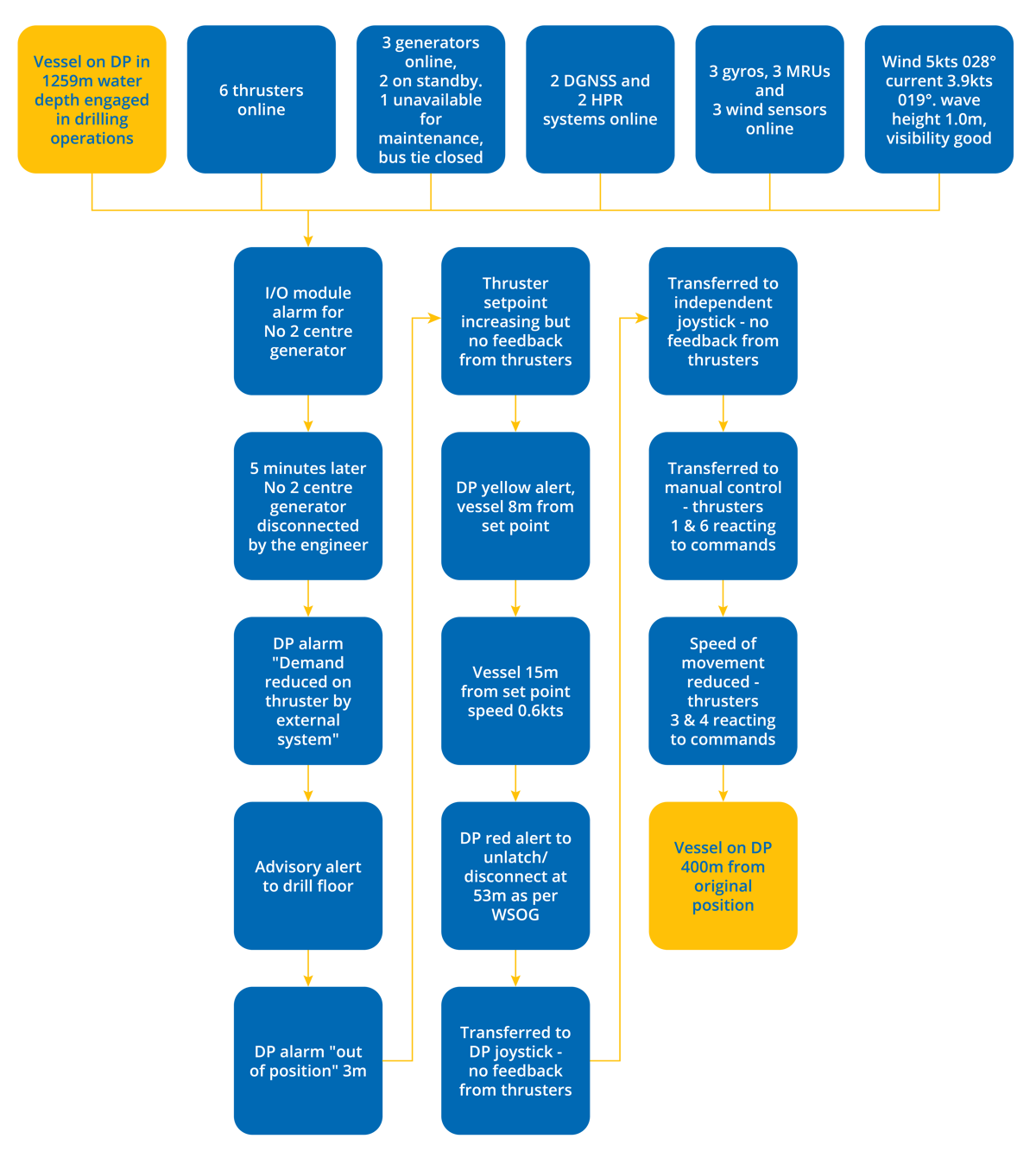Load sharing imbalance causes loss of position
- DP Event
- Published on 29 March 2017
- Generated on 12 July 2025
- DPE 01/17
- 2 minute read
Incident
Jump to:
The vessel’s DP operations manual and well specific operating guidelines (WSOG) must be questioned.

Comments
The power plant was configured to work in closed bus mode. No.2 port, No.2 centre and No.2 starboard generator were online. No.1 port and No.1 centre generator were on standby. No.1 starboard generator was on long term isolation due to turbocharger overhaul.
The vessel’s power management system (PMS) developed a fault in an I/O module for No.2 centre generator. This fault caused the generator circuit breaker status to freeze in the ‘closed’ position. The alarm indicated a generator fault causing the engineer to disconnect the faulty generator.
The breaker opened on the generator and due to the fault on the I/O module the status of the breaker was still showing connected and a load sharing imbalance was noticed by the PMS which attempted to correct it. As the disconnected generator could not take any load, the imbalance persisted and the PMS drove the bus frequency down to the point where it triggered the frequency based thrust limitation function on all thrusters leading to loss of position and an emergency disconnect.
Considerations
- It is recommended that the failure modes and effects analysis (FMEA) should consider the PMS interface so that this type of failure mode is identified.
- It would appear the PMS was not properly tested for operations in closed bus tie operations.
- The fact that frequency issues occurred suggests advance generator protection was either not present or not functioning correctly.
- The vessel’s DP operations manual and well specific operating guidelines (WSOG) must be questioned.
- The value of the current factor (3.9kts) should be questioned.
- It should be noted that when thrusters are operated via the IJS they are still under the control of the PMS.
Latest DP incidents
-
Complete the job
Whilst connected to a turbine, an alarm was generated on the DP operator station, ‘Unbalanced load on SWBD 1’.
DPE 01/25
16 January 2025
Undesired event
-
How is your alignment?
Loss of the CyScan position reference system generated a reference system failure alarm and moments later the vessel began to lose position with the accompanying alarms.
DPE 01/25
16 January 2025
Incident
-
Beware your centre of rotation
The stern thrusters started to oscillate which transferred to an oscillating motion of the vessel and high forces were being used to try to maintain position.
DPE 01/25
16 January 2025
Incident
-
A-Tension
Whilst pipelaying in shallow water, the vessel experienced a tension sensor failure on one tensioner.
DPE 01/25
16 January 2025
-
DP Drill Scenario
DP emergency drill scenarios are included to assist DP vessel management, DPOs / Engineers, and ETOs in conducting DP drills onboard.
DPE 01/25
16 January 2025
Drill Scenario
The case studies and observations above have been compiled from information received by IMCA. All vessel, client, and operational data has been removed from the narrative to ensure anonymity. Case studies are not intended as guidance on the safe conduct of operations, but rather to assist vessel managers, DP operators, and technical crew.
IMCA makes every effort to ensure both the accuracy and reliability of the information, but it is not liable for any guidance and/or recommendation and/or statement herein contained.
Any queries should be directed to DP team at IMCA. Share your DP incidents with IMCA online. Sign-up to receive DP event bulletins straight to your email.